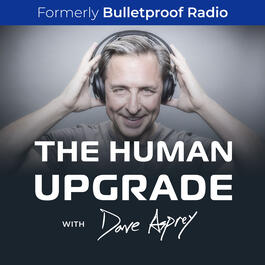
How to Get a Handle on Your Histamine – Dr. Becky Campbell with Dave Asprey
In this episode of Bulletproof Radio, you’re going to learn a lot you probably didn’t know about histamine. Turns out histamine is a major neurotransmitter that affects your awareness, food cravings, tiredness and inflammation. I’m talking with Dr. Becky Campbell, a board-certified doctor of natural medicine who focuses on histamine issues based on experiences from her patients and her own life. Histamine is a very important part of the immune system and plays a role in inflammation in the body. We also need histamine in order to digest food, move our bowels, boost exercise performance, increase attention, and get blood as well as nutrients and oxygen delivered to different parts of the body. But things can go off track. Histamine intolerance is not a sensitivity to histamine, but an indication that too much of it has built up in the body, or that there is an inability to break it down properly. So, how could high histamine affect you? “Migraines, passing out,” Dr. Campbell says. “Eating and having a really fast heart rate for no reason, having anxiety out of the blue for no reason. Any type of dermatitis, or hives, or flushing, random diarrhea, going from sitting to standing and getting dizzy. It's all over the place.” Fatigue immediately after eating also can be an indicator. “My biggest symptom of histamine intolerance is fatigue,: Dr. Campbell says. “I would eat something that was supposedly healthy for me, like fermented food, and literally felt like I took a sleeping pill.” It’s a natural response for our body to release histamine, but if we can’t break it down (which can happen from reduced enzyme activity, various gut issues, from vitamin deficiencies and more) it becomes a problem. She shares what foods to avoid and what foods to eat when you’re dealing with histamine intolerance. The most common high histamine foods include pork, citrus, fermented foods, alcohol, and aged meats and cheeses. If you eat a high histamine food and your body isn’t prepared to break it down, the mast cells that produce it (and other inflammatory chemicals) can just pour it out into the body, resulting in a lot of inflammation. Dr. Campbell estimates up to 40 percent of people could have some degree of histamine sensitivity. Vitamin C, quercetin and zinc can help. If you know (or maybe are beginning to think) high histamine negatively affects you, Dr. Becky gives you some great tips so you can identify symptoms and histamine culprits in your diet, and start finding solutions. Got a comment, idea or question for the podcast? Submit via this form. WE APPRECIATE OUR PARTNERS. CHECK THEM OUT! Prescription Blue-Blocking Eyewear: https://truedark.com; use code DAVE to save 10% Better-For-You Brews: https://www.flyingembers.com/DAVE, use code DAVE to save 15% Autophagy & Anti-Aging: https://spermidinelife.us/dave; use code DAVE25 for 25% off your first month’s order VIRTUAL BIOHACKING CONFERENCE MAY 8, 2021 Recharge Your Cells & Upgrade Your Life at this one-day event! Register at https://www.biohackingconference.com UPGRADE YOURSELF EVEN MORE Learn directly from Dave Asprey in his new membership group https://ourupgradecollective.com. DAVE ASPREY’S NEW BOOK “Fast This Way: Burn Fat, Heal Inflammation, and Become the High-Performing Human You Were Meant to Be” See Privacy Policy at https://art19.com/privacy and California Privacy Notice at https://art19.com/privacy#do-not-sell-my-info.
From "The Human Upgrade: Biohacking for Longevity & Performance"




Comments
Add comment Feedback